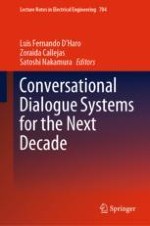2021 | OriginalPaper | Chapter
Culture-Aware Dialogue Management for Conversational Assistants
Authors : Juliana Miehle, Nicolas Wagner, Wolfgang Minker, Stefan Ultes
Published in: Conversational Dialogue Systems for the Next Decade
Publisher: Springer Singapore
Activate our intelligent search to find suitable subject content or patents.
Select sections of text to find matching patents with Artificial Intelligence. powered by
Select sections of text to find additional relevant content using AI-assisted search. powered by
